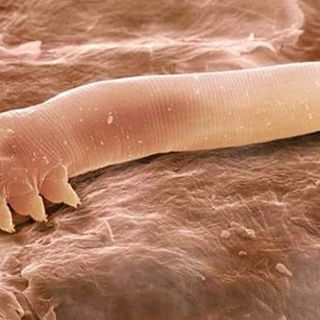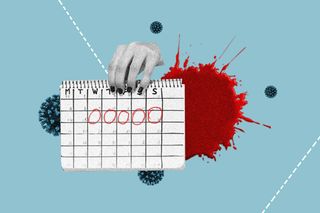
Lockdown Stress Is Disrupting Menstrual Cycles
Gynecologists believe that stress, in addition to lifestyle changes and the lack of physical exercise under lockdown, is leading to period irregularities.

Amid the Covid19-induced lockdowns across the globe, people have reported experiencing their menstrual cycles differently then before — in terms of either flow, or onset, or duration, or even cramps.
A poll of 5,677 women conducted by celebrated gynecologist Dr. Anita Mitra, who works with the National Health Service (NHS) in the U.K., revealed that 65% of the responders have been experiencing lockdown-disrupted menstrual cycles, with either irregularities in periods, or varied intensities of cramps. Several conversations on social media also reflect this trend of disruption. In India, according to Practo, a digital health platform that offers telemedicine services, every one out of three women on the portal have reached out to gynecologists under lockdown — with the most common queries being unanticipated irregularities in menstrual cycles and other period-related issues.
“Many patients have informed us over phone that their periods have become irregular and after talking to them it was found that they are feeling very stressed. Stress problems in women have increased due to the epidemic,” Dr. Anubha Singh, gynecologist and IVF expert at the Shantah Fertility Center in Delhi, told National Herald.
Stress is one the biggest causes of period irregularities, according to the NHS. And, with the lockdown unleashing a mental health crisis upon the world, stress is, of course, rampant due to the economic downturn or uncertainty about the future. In fact, a pan-India survey by IIM, Lucknow, published last month, found that fear was the most dominant emotion for 40% of Indians under lockdown.
Related on The Swaddle:
Survey: Indian Women Unable To Access Menstrual Hygiene Products Under Covid19 Lockdown
“Excess release of cortisol (the stress hormone) can suppress normal levels of reproductive hormones, potentially leading to abnormal ovulation, which can disrupt your cycle,” Dr. Sarah Toler, Doctor of Nursing Practice in Los Angeles, told Cosmopolitan. Besides causing heavier or lighter flows, and delaying or stopping the flow altogether, stress can also lead to more painful cramps. A study examining close to 400 women in China had found that extreme pain during menstruation was common in those who reported high levels of stress.
“There has been a drastic change in lifestyle since lockdown started. Diets have changed, sleeping habits and patterns have changed, people are under more stress than usual. This all definitely takes a toll on our overall well-being. A high-stress environment has been linked to altered menstrual cycles. This may manifest in different ways, some women might have their periods earlier while others might be getting them late. Yet others complain about exaggerated cycles and flows. Prolonged exposure to increased levels of the hormone has also been known to cause menstrual irregularities in women,” Dr. Archana S.K., a Chennai-based gynecologist, told The News Minute.
Lifestyle changes under lockdown, like the increased burden of childcare and housework and adjusting to work-from-home, can affect sleeping habits and dietary routines, leading to changes in menstrual cycles. Moreover, people have begun to smoke, drink and snack more under lockdown, which impacts cycles too. Also, with gyms and pools shut under lockdown, and the prospect of venturing outdoors during an ongoing, infectious pandemic frightening many, people have not been as physically active as usual. Lack of exercise can impact periods as well. According to a 2018 study, exercising during and before periods helps in reducing cramps.
Related on The Swaddle:
UN Presents Framework For Mitigating Covid19’s Impact On Women
It is the combination of stress caused by the lockdown, along with extended isolation from friends and family members, lifestyle changes, disruption of routines, and constant confinement, that has made “lockdown periods” a subject of discourse. The cumulative stress of everything going on around us, as well as adjusting to a version of normalcy we have neither experienced in our lives, may play a part in this phenomenon of menstrual disruption.
But, the consequences may not dissipate as soon as the coronavirus does. “If you had been borderline Polycystic Ovarian Syndrome, or PCOS, all along, this stress induced by the pandemic might push you over to the other side. Also since most women are now locked indoors, they’re probably not leading the healthiest of lives. Such unusual situations could exacerbate preexisting hormonal imbalances in women. For instance, if a woman had been diagnosed with mild PCOS, it might get aggravated during this time,” Dr. Singh explained.
In addition, “Cases have been seen where women under extreme stress or duress have stopped having periods altogether. Although we’ve not reached that stage yet, we just might if things continue the way they are now,” Dr. Shobha Gupta, Managing Director and IVF specialist at Mother’s Lap IVF Centre in Delhi, said. Even if the lockdown continues to ease with time, it is highly unlikely that the socio-economic manifestations of the stress induced by the pandemic will go away anytime soon — and, whether there is any impact of this unprecedented crisis on people’s menstrual cycles will become clearer only as we begin adjusting to this dystopian world.
Devrupa Rakshit is an Associate Editor at The Swaddle. She is a lawyer by education, a poet by accident, a painter by shaukh, and autistic by birth. You can find her on Instagram @devruparakshit.
Related


SC Notice Asks Indian Insurance Regulatory Body Why There Is Still No Coverage for Mental Health
